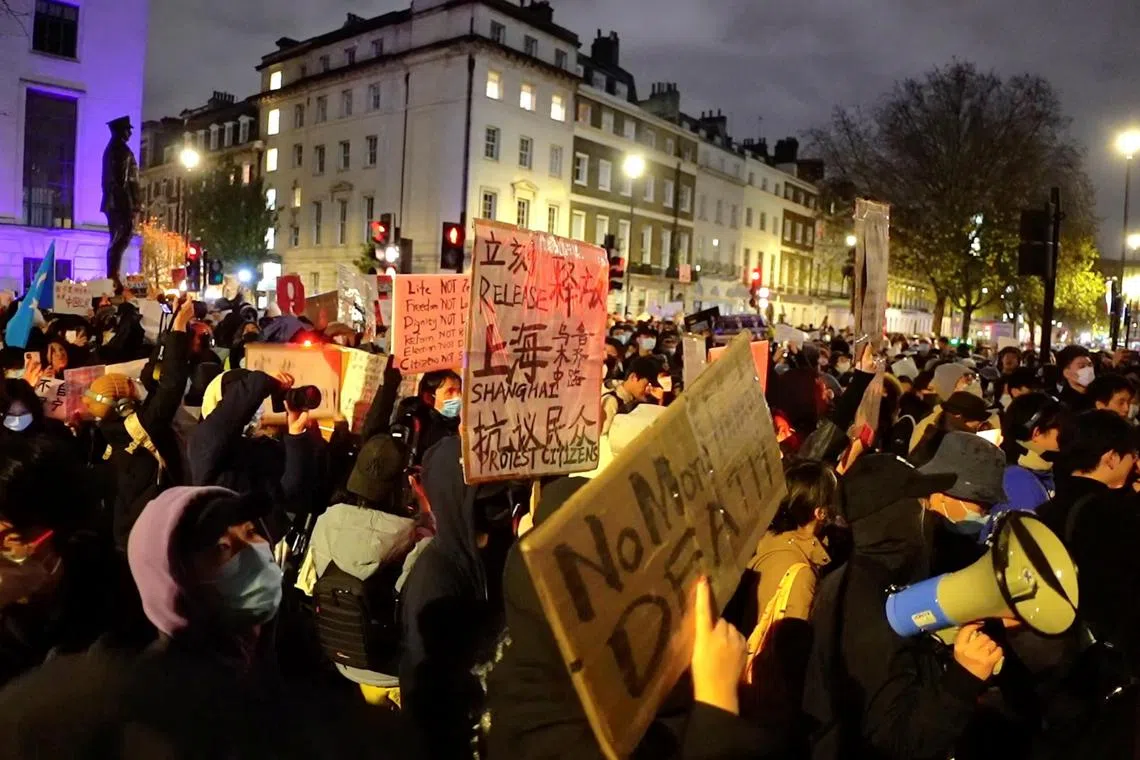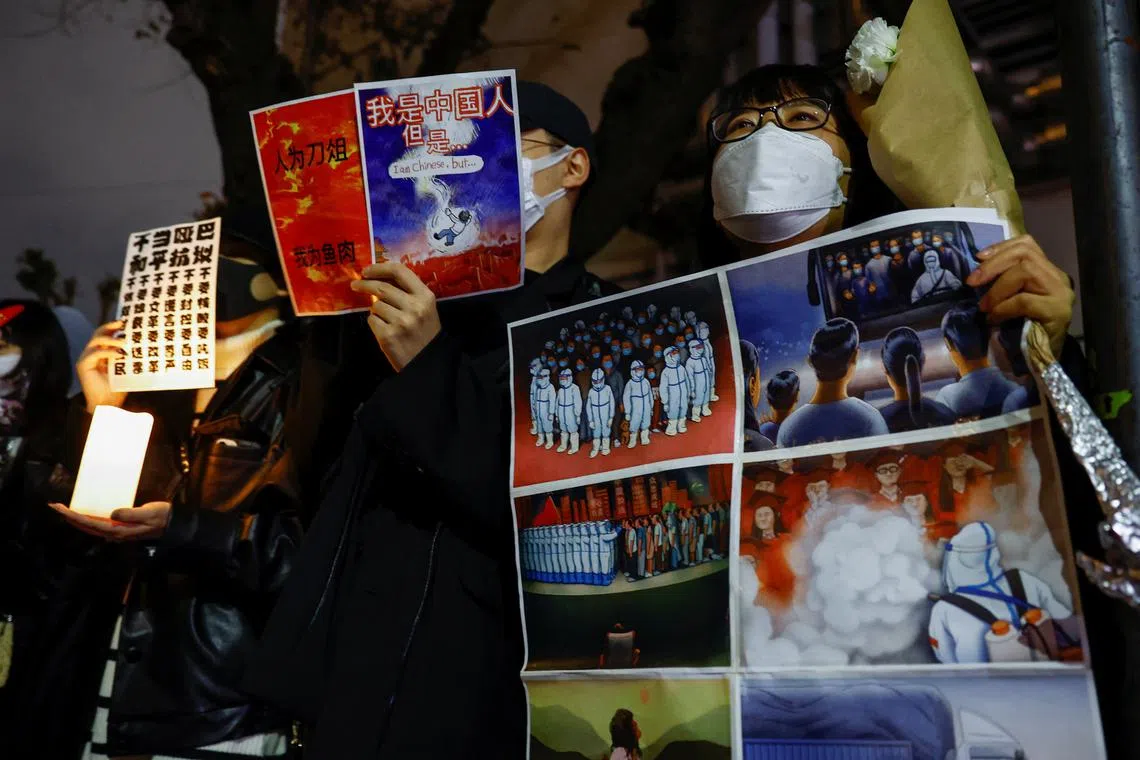China's protests over Covid-19 lockdowns spread to campuses and cities abroad
Sign up now: Get insights on Asia's fast-moving developments

People protesting against China's Covid-19 curbs in front of the Chinese embassy in London on Nov 27.
PHOTO: REUTERS
HONG KONG - Protests against China’s strict zero-Covid-19 policy
Small-scale vigils and protests have been held in cities in Europe, Asia and North America, including London, Paris, Tokyo and Sydney, according to a Reuters tally, organised by expatriate dissidents and students.
Dozens of people attended most of the protests with a few drawing more than 100, the tally showed.
The gatherings are a rare instance of Chinese at home and abroad uniting in anger.
The protests on the mainland were triggered by a deadly fire in China’s Xinjiang region
The disaster was blamed in part on lockdown measures. City officials denied that.
On Monday evening, dozens of protesters gathered in Hong Kong’s Central business district, the scene of sometimes violent anti-government demonstrations in 2019.
“I think this is the normal right of people expressing their opinion. I think they should not suppress this kind of right,” said Mr Lam, a 50-year-old Hong Kong citizen.
Dozens of students also gathered at the campus of the Chinese University of Hong Kong to mourn those who died in Xinjiang, according to video footage online.
A US National Security Council spokesman said on Monday that the United States backs the right of people to peacefully protest, including in China.
“We’ve long said everyone has the right to peacefully protest, here in the US and around the world. This includes in the PRC (People’s Republic of China),” the spokesman said, adding: “We think it’s going to be very difficult for the People’s Republic of China to be able to contain this virus through their zero Covid-19 strategy.”
Since President Xi Jinping assumed power a decade ago, authorities have clamped down on dissent, tightening controls on civil society, the media and the Internet.
But the strict policy aimed at stamping out Covid-19 with lockdowns and quarantine has become a lightning rod for frustrations.
The policy has kept China’s death much lower than many other countries.
But it has come at a cost of long spells of confinement at home for many millions and damage to the world’s second-biggest economy.
Nevertheless, Chinese officials say it must be maintained to save lives, especially among the elderly given their low vaccination rates.
Some overseas protesters said it was their turn to take on some of the burden their friends and family had been enduring.
“It’s what I should do. When I saw so many Chinese citizens and students take to the streets, my feeling is they have shouldered so much more than we have,” said graduate student Chiang Seeta, one of the organisers of a demonstration in Paris on Sunday that drew about 200 people.
“We’re now showing support for them from abroad,” said Ms Chiang.
A Chinese Foreign Ministry spokesman told a regular briefing on Monday that China was not aware of any protests abroad calling for an end to the zero-Covid-19 policy.
Asked about the protests at home, the spokesman said the question did not “reflect what actually happened” and said China believed the fight against Covid-19 would be successful with the leadership of the party and the cooperation of the people.
Blame
It has been common in recent years for overseas Chinese students to rally in support of their government against its critics but anti-government protests have been rare.
Outside the Pompidou Centre in Paris, some protesters brought flowers and lit candles for those killed in the Xinjiang fire.
Some blamed President Xi and the Communist Party and demanded their removal from office.
Defiance towards the Chinese President has become increasingly public after a dissident hung a banner on a Beijing bridge in October
About 90 people gathered at Shinjuku, one of Tokyo’s busiest train stations, on Sunday.
They included a university student from Beijing who said any protests in China against Covid-19 rules would inevitably focus blame on the Communist Party.
“At the core of it is China’s system,” said the student, who asked to be identified as just Emmanuel.

People protesting against China’s Covid-19 curbs near the Chinese embassy in Tokyo on Nov 28.
PHOTO: REUTERS
But some protesters were uncomfortable with more belligerent slogans.
An organiser of a protest planned for later on Monday at Columbia University in New York, who asked to be identified as Shawn, said she would steer clear of sensitive issues such as calls for Taiwan’s independence and China’s mass internment of ethnic Uighurs in Xinjiang.
“We have spoken to some activists from Taiwan and Xinjiang… We’ve agreed to refrain from (that),” said Shawn from the Chinese city of Fuzhou.
“We know that may alienate a lot of people.” REUTERS


